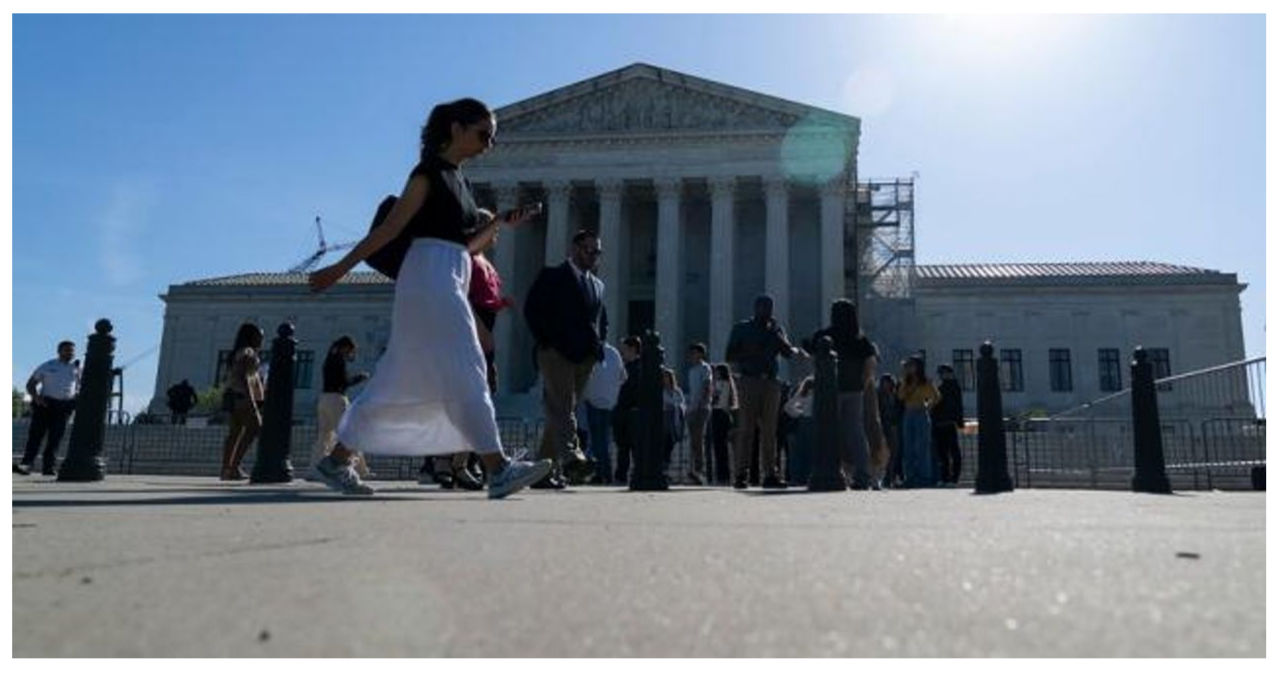The Supreme Court questioned the extent of a federal obstruction law that has been applied to numerous individuals involved in the January 6 riot, including former President Trump. This scrutiny suggests that the justices may have concerns about the Justice Department’s broad prosecution of the Capitol attack.
Joseph Fischer, a former police officer, is facing multiple charges for his alleged involvement in the storming of the Capitol on January 6, 2021. As part of his defense strategy, he has sought to challenge one of the counts against him – obstruction of an official proceeding.
Section 1512(c)(2) of the law criminalizes the act of obstructing, impeding, or interfering with official inquiries and investigations conducted by Congress. This offense is considered corrupt and can result in a maximum prison sentence of 20 years.
Jeffrey Green, the attorney representing Fischer, put forward the argument on Tuesday that the law was specifically designed to address acts that impact the “integrity or availability of evidence”, rather than acts that obstruct an official proceeding without any effect on the evidence.
The Department of Justice (DOJ) argued against Fischer’s interpretation, stating that it placed an unnecessary restriction on the scope of conduct that could be prosecuted under the charge. According to the DOJ, Congress intended for the statute to be a broad provision that covers various acts, not just limited to the destruction of records, documents, or objects.
The charge in question dates back over two decades, having been implemented in 2002 following the Enron scandal. This scandal involved the imprisonment of high-ranking executives at the energy company for their involvement in fraud and other illegal activities that ultimately led to the company’s bankruptcy.
Over 1,300 individuals have been charged for their involvement in the Capitol riot. Among them, approximately 353 individuals have been accused of obstructing Congress’s official count of Electoral College votes on that fateful day. The vote certification serves as the concluding stage of the presidential election process, which, in 2020, solidified President Biden’s victory over Trump.
But Fischer and numerous other defendants from Jan. 6 argue that the charge has been unjustly applied to individuals who participated in the Capitol unrest.
During the court proceedings, the conservative justices of the high court raised questions about the usage of the charge in cases other than the Capitol attack. U.S. Solicitor General Elizabeth Prelogar acknowledged that the Department of Justice has employed this statute in prosecutions where actions have revealed the presence of a grand jury or an undercover law enforcement officer.
Justice Neil Gorsuch posed a thought-provoking question during his discourse, highlighting potential scenarios where a disruptive heckler in the Supreme Court or the triggering of a fire alarm during congressional votes would be subject to legal prosecution.
Prelogar explained that if the Justice Department is able to demonstrate that the person involved in those actions acted “corruptly” and with “intent,” then those cases would satisfy the criteria outlined in the statute.
The solicitor general also focused on the Capitol attack and highlighted the significance of the charge in those prosecutions.
Justice Brett Kavanaugh questioned why Fischer’s other six charges related to January 6th aren’t sufficient. Prelogar responded by explaining that Fischer’s central behavior was focused on undermining the certification of the 2020 presidential election by Congress and his intent to prevent it.
According to her, the Justice Department should have the authority to hold Fischer responsible for his actions.
During the proceedings, the justices delved into the precise wording of the statute, focusing on the term “otherwise” that serves as a delineation between the two parts of Section 1512(c). The first part of the section addresses the destruction of records, while the second part encompasses any action that “otherwise obstructs, influences, or impedes any official proceeding.”
The Justice Department argued that the law intended to cover any remaining behavior, but Fischer contends that the legislation was designed to concentrate on concrete evidence.
Frederick Ulrich, the lawyer representing Fischer, argued in his petition to the high court that if simply attempting to influence a congressional committee were considered a crime, it would be akin to transforming all of Washington’s office buildings into prisons.
During the assessment, an unexpected supporter emerged in the form of Biden. When he was a senator, he described the subsection as “making it a crime for document shredding.” Judge Carl Nichols, a U.S. District Judge, referenced Biden’s statement when he dismissed an obstruction charge against another Jan. 6 defendant, ruling that it did not apply to their actions.
The charge in Fischer’s case was dismissed by the same judge, but the U.S. Court of Appeals for the District of Columbia Circuit overturned the judge’s decisions in both cases.
The Justice Department’s interpretation of the law was supported by the D.C. Circuit and over a dozen other Washington District Court judges.
Many individuals associated with the extremist groups, Proud Boys and Oath Keepers, including their leaders Enrique Tarrio and Stewart Rhodes, have been charged and convicted. Numerous other defendants, with less severe cases, have either pleaded guilty or been found guilty at trial.
The standout figure in this situation is undoubtedly Trump himself. He currently faces charges in his federal election interference case, which is being prosecuted in Washington, D.C. Although his case was not discussed during the arguments, a Supreme Court ruling in favor of the rioters would ultimately weaken the charges against him and the rioters involved.
The D.C. federal case involving Trump has come to a halt as the Supreme Court examines his challenge to presidential immunity. This challenge is set to be discussed in oral arguments before the high court next week.
The judge presiding over the trial of the former president in Manhattan has ruled that he cannot attend oral arguments at the Supreme Court in place of his ongoing criminal trial. The former president is currently facing charges related to a hush money deal before the 2016 election.

